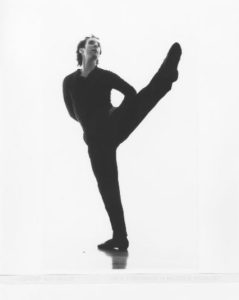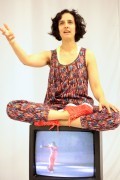Material and Bodily Archives, Oral Histories, and Kinesthetic Connections
Perspectives on working with passed down materials in dance, performance and analysis
An international Performance Symposium/Workshop

2. Mai 2014 ab 13 Uhr, 3.Mai 2014 ab 10 Uhr
Tanzstudio (Raum Nummer 2.105), Universität Salzburg, Unipark Nonntal; Erzabt-Klotz-Straße 1, 5020 Salzburg
2. Mai 2014, 20 Uhr- Performance /Performance-Lecture
SEAD, Schallmooser Hauptstraße 48a, 5020 Salzburg

This international performance-symposium will focus on the relationship between material and intangible archives in dance and performance. The question of how oral histories, and material, bodily and other intangible archives are preserved and passed on, and what their role and relevance is in the present will be explored theoretically, practically, and methodologically. Through lecture-performances and workshops, as well as a larger roundtable discussion spread out over 2 days, this event sets out to investigate oral histories and multiple archives of dance and performing arts: from material archives to bodily archives, oral traditions, scores, kinesthetic connections, memories, and the moment of (restaged/reconstructed) performance. The transcultural and transhistorical juxtapositions and constellations brought together shall highlight in between spaces, and new openings, not for the past, or the future, but for the moment of performance.
Schedule
Friday, 2nd May 2014
at Tanzstudio (Room 2.105), Unipark Nonntal, Erzabt-Klotz-Str. 1, Salzburg
- 13 h – Welcome
13:30 – 16:30 h – Oral Histories Training Workshop (part 1) with Jeff Friedman
LEGACY Oral History Program at the San Francisco Museum of Performance & Design have been providing consulting and training workshop for the past twenty years as a service to the performing arts communities of the San Francisco Bay Area, and local, regional, national and international academics in a variety of research disciplines, including Sports History, Women and Gender Studies, Native American and First People’s studies, Ethnic Studies, Sociology and Anthropology, and Environmental History, among other disciplines, and individuals and corporations interested in acquiring archival expertise for both family and business history projects, respectively. The oral history training workshop first provides participants with the fundamental knowledge required to design an oral history project, including preparation for legal and ethical issues and forms, and a template for the preliminary interview and subsequent research, prior to the interview recordings themselves. The second session includes three intensive theory/practice sessions where lectures on oral history interviewing basics are provided, each followed immediately by three sessions in which the theories are applied in practice. The final topics of the workshop address processing recordings, with two lectures on transcription and editing procedures, with a final practical editing session using verbatim transcripts from LEGACY’s collection.
SESSION I:
- Introduction to Oral History and Dance (or wider)
- Project Design: Research vs. Archival orientations
- Legal/Ethical issues: Intellectual property rights/Fair use law
- Preliminary Interview method and practice
- break
17:00 h – “Bodily Archives: Memory, Kinesthesia, and Transnational Labor in Indian Dance”– Performance Lecture by Priya Srinivasan
In this performance lecture titled “Bodily Archives: Memory, Kinesthesia, and Transnational Labor in Indian Dance” I explore the connections between oral storytelling, memory, kinesthetic traces, and the dancing body in Indian dance practices to reimagine the relationship between the past and the present. Using archival sources, ethnographic material, and Indian dance “memory” which involves music, dance, text, stories, myths, narratives, and the body, I hope to highlight the ability of the dancing body to re-imagine history, power, and culture from another place.
- break
20:00 h – Evening program at SEAD, Schallmooser Hauptstr. 48a, Salzburg
Future Memory
Performance by Rani Nair, dramaturg: Kate ElswitWhat does it mean to inherit a dance? German choreographer Kurt Jooss made his last piece Dixit Dominus in 1975 as a gift for Swedish-based Indian dancer Lilavati Häger, who gave it to Rani Nair to reconstruct in 2003.Future Memory (2012) returns to Dixit, this time focusing not on the choreography but on the stories around it. It is a second-order performance — a performance about a performance — that uses the personal responsibilities of inheritance to move towards larger questions of history, memory, and legacy. A review from the premiere described it as combining “Humor, warmth, and intellectual sharpness, all in one.” With a combination of gentleness and challenge, Memory embraces the possibility of an alternative history, one in which a “minor” dance takes ten years of another artist’s life, and where insider and outsider are more complicated than we might think. Here both identity and dance history are understood not in terms of Indian versus Western European, but in a hybrid way that uses real and imagined archives to allow for shades of Indianness, Swedishness, and Germanness. Nair’s one-hour solo uses dance, spoken text, film, and singing in more and less spectacular forms. There are moments when audiences are invited to touch and smell.
“The Eros of Oral History”
Lecture-Performance by Jeff FriedmanAs a dance artist and professor of dance studies, my purpose is advocating for returning embodied experience to the historical record. For me, the ideal method to accomplish this goal is oral history, where the interview event is a live embodied performance involving not only the voicing of historical recollection, but a fully embodied communication event. My lecture addresses the “erotic” interview from three perspectives: first, oral history AS an embodied communication event, where nonverbal communication is valued and described in detail. Second, oral history FOR the body, involving a description of my oral history project for dance titled LEGACY, now the largest archive of its kind in the U.S. outside of New York City. Thirdly, oral history IN performance, where I describe documentary performance events based oral history interviews in a variety of genres, including music, theater and dance. The lecture concludes with a live performance of excerpts from my own choreography titled Muscle Memory, based on oral histories of dancers from LEGACY’s collection.
Saturday, 3rd May 2014
at Tanzstudio (Room 2.105), Unipark Nonntal, Erzabt-Klotz-Str. 1, Salzburg
10-13:00 h – Roundtable
with Roman Arndt, Jeff Friedman, Sigrid Gareis, Wibke Hartewig, Lisa Hinterreithner, Rani Nair, Priya Srinivasan, Joëlle Vellet, and dance faculty/researchers from the Department of Music and Dance Studies, University of Salzburg
- break
14:00-17:00 h – Oral Histories Training Workshop (part 2) with Jeff Friedman
SESSION II:
- Interview Training 1: Open-ended questioning
- Interview Training 2: Embedding Eye-witness accounts within Historical matrix
- Interview Training 3: Embodied Channels of Communication in Interviews
- Transcription/Editing theory and method
Organisation: Sandra Chatterjee und Claudia Jeschke



![]()

In Kooperation mit: SEAD Salzburg Experimental Academy of Dance
Im Rahmen des Forschungsprojekts Traversing the Contemporary (pl.): Choreographic Articulations between European and Indian Dance (Austrian Science Fund (FWF): P24190; 2012-2015.